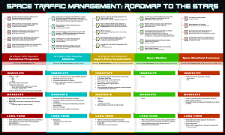Presentation Type
Paper (supporting PowerPoints may be added as Additional Files)
Location
Henderson Welcome Center
Start Date
17-11-2016 3:45 PM
Abstract
In November of 2015, President Obama signed the U.S. Commercial Space Launch Competitiveness Act (CSLCA) into law. The CSLCA addresses many subjects orbiting the field of space activities, although much of the attention respecting the law has focused on the role of government astronauts, the processes associated with licensing private remote sensing systems, or the authorization of space resource extraction; yet, a curious theme has found itself woven throughout the fabric of the law—the requirement to report to Congress the results of studies and inter-agency discussions impacting on various components of current or proposed activities. The legal and regulatory implications of multiple calls for studies cannot be discounted. The CSLCA’s focus on commercial regulatory matters included the recognition of the importance of space traffic management. In particular, Section 110 of the Act—on Space Surveillance and Situational Awareness Data—requires the Secretaries of Transportation and Defense to “study the feasibility of processing and releasing safety related space situational awareness data and information”, as well as how to keep such processes consistent with national security and safety needs. These reporting requirements have several factors in common: firstly, the government’s need for more information; secondly, the general need to discern legal and regulatory authorities in commercial space matters; and finally, the importance of maintaining compliance with international obligations. This paper seeks to explore these statutorily required reports, as well as the legal and regulatory implications of Congressional interest in developing clearer STM systems for the future.
Area of Interest
Space Situational Awareness
Biographies
The Reporting Requirements of the U.S. Commercial Space Launch Competitiveness Act: Status, Analysis, and Legal Implications
Henderson Welcome Center
In November of 2015, President Obama signed the U.S. Commercial Space Launch Competitiveness Act (CSLCA) into law. The CSLCA addresses many subjects orbiting the field of space activities, although much of the attention respecting the law has focused on the role of government astronauts, the processes associated with licensing private remote sensing systems, or the authorization of space resource extraction; yet, a curious theme has found itself woven throughout the fabric of the law—the requirement to report to Congress the results of studies and inter-agency discussions impacting on various components of current or proposed activities. The legal and regulatory implications of multiple calls for studies cannot be discounted. The CSLCA’s focus on commercial regulatory matters included the recognition of the importance of space traffic management. In particular, Section 110 of the Act—on Space Surveillance and Situational Awareness Data—requires the Secretaries of Transportation and Defense to “study the feasibility of processing and releasing safety related space situational awareness data and information”, as well as how to keep such processes consistent with national security and safety needs. These reporting requirements have several factors in common: firstly, the government’s need for more information; secondly, the general need to discern legal and regulatory authorities in commercial space matters; and finally, the importance of maintaining compliance with international obligations. This paper seeks to explore these statutorily required reports, as well as the legal and regulatory implications of Congressional interest in developing clearer STM systems for the future.



Comments
Visit the Research Panel: Governance